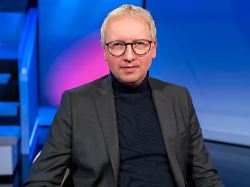Talk about Russia at Illner
Varwick: ‘We should deal with Russia as it is’
6/30/2023 5:37 am
After the failed Wagner rebellion, many questions remain unanswered. Among other things, whether Putin is now even more firmly in the saddle or rather battered. The political scientist Varwick tends towards the former and calls for Maybrit Illner to once again speed up peace negotiations.
Was it a coup, a mutiny or a protest march? Whatever happened in Russia last Saturday, it failed in the end. There are many indications that heads are already rolling in Moscow. This is how the top Russian general Sergey Surovikin could have been arrested. According to media information, he knew about the uprising plans of the head of the Wagner army, Prigozhin. ZDF foreign correspondent Katrin Eigendorf, who has been reporting from Ukraine for a long time, also assumes that Russian President Vladimir Putin could launch a wave of cleansing after the failed uprising. “Many expected that Surovik was arrested,” she says on Maybrit Illner on ZDF. There the guests on Thursday evening dealt with the current situation in Russia.
Military expert Frank Sauer from the Bundeswehr University in Munich states: Prigozhin’s uprising failed. “He noticed that no one was clearly on his side. But no one was on Putin’s side either,” he says. That’s not how the Security Council in Russia worked on Saturday. “It looked chaotic, and it was,” analyzes Sauer. He is certain that Prigozhin had planned the mutiny long beforehand. He also relies on the findings of American intelligence services. Prigozhin had hoped to appoint the Russian Chief of Staff Gerasimov in Rostov. That failed, and he had his mercenaries driven towards Moscow. Sauer speaks of an “accidental putsch”.
Putin’s loss of loyalty
Eastern Europe historian Franziska Davies is also certain that Putin has suffered a loss of loyalty. But that doesn’t have to mean that the Russian system of government will implode. After all, even during the uprising in Russia, the war in Ukraine continued unabated.
Political scientist Johannes Varwick from the University of Halle is surprised at the reactions in Germany to the putsch. He says there were two camps in Germany. One wished for chaos in Russia in the hope that the war in Ukraine would end more quickly, while the other camp viewed developments in Russia with concern. He also belonged to this camp. Varwick’s assessment: “For now, Putin has won this power struggle.” In general, one should say goodbye to the hope that something better would come after a possible fall of the Russian president. “Varwick: “We should deal with Russia as it is, and we should be prepared for the fact that Putin is the one who has to be considered as a negotiating partner.”
“Nobody won, certainly not Putin,” contradicts SPD foreign policy expert Michael Roth. “Putin stood there for a moment, naked as emperor. We only have to put ourselves in the place of a dictatorship for a moment. A dictatorship lives from the fact that there is someone who has everything under control. And there was an absolute loss of control, for a dictator it was an absolute meltdown .” Putin promised his people security and order, and the promise faltered over the weekend. Roth fears that Putin will continue the internal Stalinization and hit Ukraine with undiminished severity. “Putin needs success now to make it clear that he’s back.”
No acute danger from nuclear weapons
The US government was particularly concerned at the weekend that government structures in Russia could collapse and control over nuclear weapons could be lost, says US Lieutenant General a. D Ben Hodges. Frank Sauer can calm things down here. He has dealt with nuclear weapons as part of his research work and explains: “There are twelve camps for sub-strategic weapons in Russia. Even a force as large as the Wagner army cannot simply drive in there and use the weapons. They are deactivated. You have to activate the electrics first, insert a neutron source, etc.” There is no red button that you have to press to activate it. “Such a weapon has a sensor system that checks whether it makes sense to explode without the weapon even having flown.” This danger was not particularly great, says Sauer.
How is the war supposed to end?
An important topic for Illner on Thursday evening is the question of whether the end of the war has come closer after the uprising in Moscow.
Varwick is once again indirectly in favor of stopping arms deliveries to Ukraine. “We shouldn’t get into a further escalation with Russia, and above all we have to help Ukraine to assert itself as a sovereign state, but also not to break down more and more.” Varwick has spoken out in favor of stopping arms shipments on numerous occasions. “The strategy of the West is not successful, Ukraine is going to the dogs,” he said on Thursday evening at Illner. He is in favor of speedy peace negotiations, even if Ukraine would lose part of its territory in the process.
The other guests see it completely differently. Michael Roth from the SPD counters Varwick: “The people in Ukraine have shown themselves to be courageous. We have to give Ukraine even more support so that it can stand up to Russian brutality. We’ve seen that Putin can be beaten, but only if “If we keep supporting the Ukrainian side. Then there might even be negotiations with Putin. That could be the end of this terrible war.”
